City Government
Prime Lunchtime with the City Manager: CyberSecurity, Redevelopment, Performing Arts Center and more [Podcast]
Published
5 years agoon
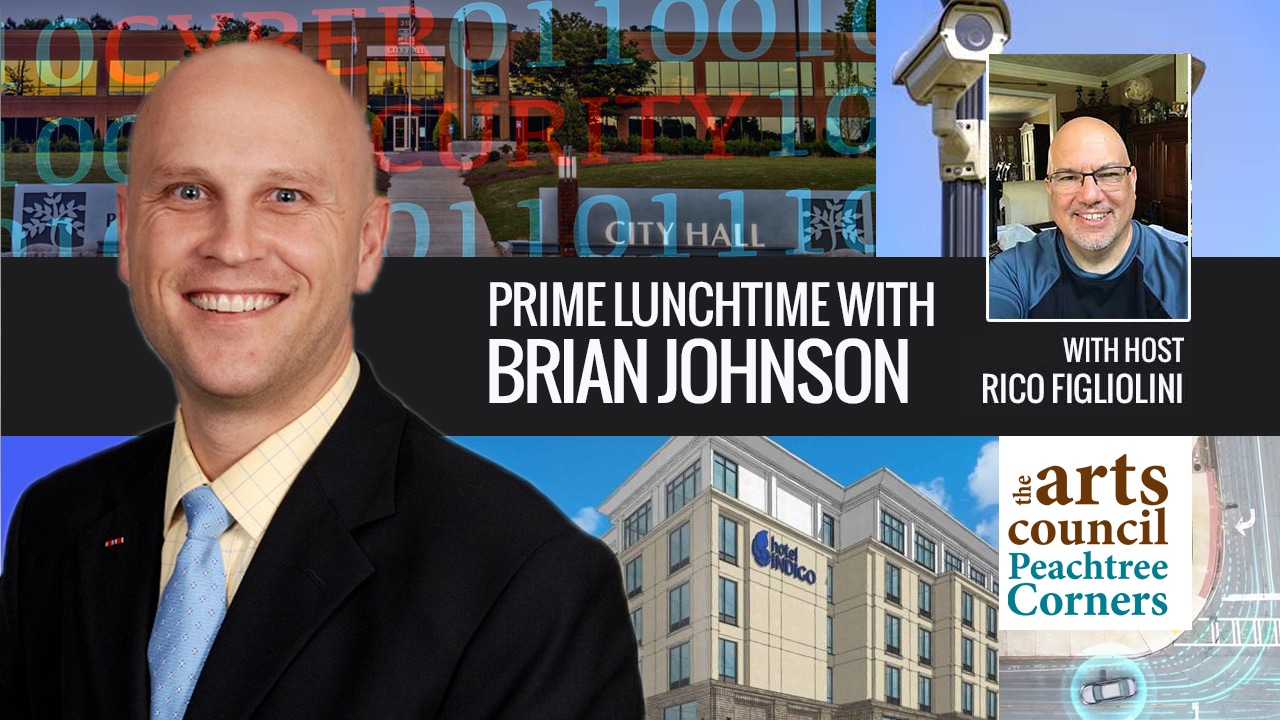
Join Rico Figliolini as he sits down with Brian Johnson, City Manager of Peachtree Corners and listen in as they discuss the challenges of protecting the city from online attacks, the use of surveillance cameras through the city right of ways, growing international interest in Curiosity Lab at Peachtree Corners, how a planned redevelopment authority will work, what a performance art center may look like, news about the Indigo Hotel and Innovation Lofts and more.
I appreciate my staff. I mean, I’ve got bosses that support me, no doubt they have a lot of innovative foresight when it comes to their governance… I know one thing well and that is that I don’t know everything. So I just try to surround myself with people that are smarter than me and ask them what they need to get the job done and do my best to provide it to them and then get out of their way. So I’ve got some great staff that does it and it’s exciting to be a part of the city.”
Brian Johnson
Timestamp:
[00:00:30] Intro
[00:00:41] Cyber Security
[00:10:02] License Plate Cameras
[00:17:06] Redevelopment Athority
[00:35:50] International Interest in Curiosity Lab at Peachtree Corners
[00:42:58] Arts Council / Performing Arts Center
[00:46:07] Fiserv, Indigo Hotel and Innovation Lofts
[00:49:10] Closing
Podcast Transcript
Rico: [00:00:30] Hi everyone. This is Rico Figliolini host of Peachtree Corners Life and this episode of Prime Lunchtime with City Manager, Brian Johnson. Brian, welcome.
Brian: [00:00:38] Thank you.
Rico: [00:00:41] It’s funny, we were talking just off camera, a little bit about what we had to talk about close to the holidays. How much is going on and is it quiet because there’s less traffic out there. I’m thinking it’s also quiet, but now there’s so much going on. That I’m excited. I’m excited to hear about all the stuff that’s going on here that’s going to be happening in 2020. Hopefully we’ll be getting even in there. So let’s just run, start right into it, because one of the major things that just recently happened was another city got hit with cyber attack. New Orleans and cyber security is a real big thing. So tell us, because now the city’s looking at what they should be doing, right? Atlanta happened. Louisiana, all the cities. There’s another small city that got hit like that recently. So tell us what our city is doing to plan for that.
Brian: [00:01:30] Well, you know, we have had some things in place before, so it’s not like, you know, we just, you know, a couple of days ago woke up or like, Ooh, we have to do something. But, you know, with some of the attacks that we’ve seen recently, we realized that we need to really take a hard look at it. So we, so I took somebody who’s currently on staff who’s really well versed in this, has been his entire career and sent to him to some extra schooling. And it’s Brandon, Brandon, the assistant city manager, who I gave him the collateral duty of being the chief technology officer for the city and sending him to some extra training and things like cybersecurity. And he has come, you know, he came back from some of that and some of his research and we, we upgraded some of the, there’s kind of like four legs to the cybersecurity stool. And you have certain aspects of information coming in and out that you’ve got to make sure are hardened, you know, whether it’s your firewall or you know, how you store it, whether it’s cloud or server or, and your access points. And you know, there’s just different things that you’ve got to look at. And so we’ve upgraded three of the four already, and we’re getting ready to do the fourth leg. So we, we’ve already hardened some of our stuff. Second thing though, is as we’re looking at this, you realize that one of the byproducts of having a city be more known out there in the, you know, internet universe, it puts us into a position where more people tend to probe our defenses the day of our grand opening of curiosity lab. We had, I believe it’s a 2000% increase in attack attempts penetrate down or penetration attempts at our firewall from the day before. Just because we had, we were out there. We’re talking about it and you know, all this good stuff. And so people out there like, well, who’s this? You know, what’s the city of Peachtree corners? And let’s see if we can’t get here. So it’s, you know, it’s an unfortunate byproduct of that. And then, so, you know, you recognizing the risk, doing things that, you know, that preventative things from an equipment standpoint to set yourself up the best way for success. Having redundancy and you know, things like if something happened, we can fall back and we didn’t lose all the information, we’ll pull back. And then the last thing, the most important, most people don’t realize this, but the biggest, greatest risk for hacking or the greatest. Well, I guess, well, it’s the greatest, the most significant risk for there being an opportunity for hacker to come in is created in the 18 or so inches between where somebody sits at their desk and their
computer or USB drive. Most of these things happen because somebody clicked on something and opened a way for a hacker to get in. New Orleans was that way. Somebody clicked on something and invited. I think it’s ransomware. Yeah. Into the system. And so we have, we have initiated an internal training program. We have done things like sending out internal to our IT team. We send out. Phishing, fake phishing emails to see who’s clicking on these things and then educating them on. But I mean, we do an internal, but you know, so when you do it, it doesn’t do anything other than tell us who clicked on it. And then we have training sessions on, here’s what happened. Here’s, here are some ways that when you see something that is unique that you can determine whether it’s legit or not, or it, a lot of it comes down to, you know, if you see something, say something, right. And we hear that all things like at the airport or whatever, you know, when it comes to terrorism or whatever, but even on here, if you see something in an email that’s weird and they’re asking, you, don’t just ask, so how’s the expert? You know, Hey. Yeah, yeah. Call it in and say, Hey, should I click on this? This is weird. Or, or forward it and say, that’s it. You know? And, and so we’ve, most everybody, including members of city council were very good and sending an email back saying, is this spam or is this whatever. We had a, we have a few. And so it’s just, it’s just, it’s just education.
Rico: [00:06:38] Private companies to do this as well. And they don’t. I don’t think they do it as well in smaller companies. I don’t where I’ve worked. Same thing though, because we’ll get phishing emails all the time and they’ll forward it to me because I’m the default IT guy. But yes, I know. So it’s like never click on anything that looks stupid. Even if Apple, if it looks like an Apple paid receipt and it just wants you to verify that this is, you, do not click on a link, go to Apple itself, sign in. And find out because they’ll let you know there, and most companies don’t send emails out of the wreck tufts of things. It’s just like, but they’re getting better than me. Most phishing emails will be the standard. Here’s the link, and I think you would be interested in this, and it looks like your friend’s email was some on someone else’s email, but it’s not. But some of them are really, they’re getting better at imitating a good legitimate Amazon email. I’ve got one of those where it was an Amazon, looked like it was, Amazon had all the strings to it even, but it was mass, the URL. So you really couldn’t see what was going on there. It’s just like ridiculous. So people will click on those?
Brian: [00:07:48] Yes.
Rico: [00:07:49] Cause if you get thousands of those or hundreds or 20 a week. No one of them you might click on then.
Brian: [00:07:56] That’s right. That’s all it takes. So, yeah, so you know, we’ve really recognized in it, and it’s really not a matter of if, when we get somebody, you know, inside the system, we just are, or we’re feeling more confident all the time that if it does, we can quickly isolate it and we’re not going to be crippled.
Rico: [00:08:18] Yeah. But you’re looking at that. There’s so much software they can figure that stuff out.
Brian: [00:08:22] There is. But you know, one of the big things that helped, you know, kind of motivate us maybe to get ourselves to, you know, kind of the cutting edge of this is his curiosity lab. Just the amount of data that we’re going to have generated. And oftentimes that data could be proprietary. And if it got out, it could harm a company that was doing testing and data. And imagine if like you had a car manufacturer doing some tests on, say, you know, some, some advanced technology on their vehicle and that data got out to their competitor that could hurt them. And we don’t want to be. And so we’ve had to really look at our data management plan and creating one with some help of some experts to make sure that we have as good of, one is really, we want it to be a model. We want it to be best in show, and it’s helped. Since curiosity lab, we’ve had to spend so much time on that. It’s helped us apply it to the city.
Rico: [00:09:25] And your partnerships with like Sprint and other companies probably help with some knowledge base coming in, right?
Brian: [00:09:31] No doubt about it. I mean, we’ve taken, as you know, the stance of, you know, aside from the fact that we have the service delivery model of outsourcing, so we’re very used to pulling in experts in different, but we’ve got experts in these very, you know, specific technical fields and we just pull information from them when need be. And so we have a, a large private network of partners that we pull from when it comes to these areas to say, look, we need to ultimately get here. Help us get there because this is in your area of expertise.
Rico: [00:10:02] Cool. So moving over to cyber secure from cyber security to camera, we talked about camera, plate ID, facial ID, security cameras outside of subdivisions. Where’s up overload in January? Maybe something that’s…
Brian: [00:10:17] Yeah, so January I think I’m going to be presenting counsel with the locations on public streets that we’re going to place them. And then Gwinnett County is almost ready to start receiving that data look in real time. So ultimately how it will be set up is we will have cameras at certain intersections on certain public streets. So just understand that the cameras we’re talking about right now on cameras that are placed in the public right away, and they’re oriented on the public right away, no private, you know, probably not. You know, none of that. I mean, you potentially pick one up depending on the orientation of the camera, but it’s oriented out of public right away and the purpose. And so these are video and surveillance. Oh and license plate recognition cameras together and the data collected from it will go to the cloud and the only one accessing this information is going to a County PD.
Rico: [00:11:17] Okay. How long does it stay in the cloud?
Brian: [00:11:20] 30 days. We will have it 30 days in the cloud and then it’ll be essentially recorded over. Day 31 comes in, day one gets recorded.
Rico: [00:11:30] So police, in case there was a, a robbery or burglary or, shoplift or whatever, they could probably get that data to the heavy enough time. 30 days is enough time.
Brian: [00:11:41] That’s correct. And if it’s not, we can look at what it would cost to go a little bit longer. But, you know, as you know, storage, whether it’s a server in the cloud costs. Yeah. And so we, but we want them to have access to, yeah. Gwinnett County PD would have access two ways. One, the license plate recognition data is real time. And so if a license plate was on a vehicle that had some sort of a warrant out, you know, BOLO be on the lookout associated with that. It automatically sends us a message to Gwinnett County PD. Here’s what license plate, here’s why there’s a, you know, here’s the location, and if it’s serious enough, right? Gwinnett County PD can dispatch officers maybe beyond where they just got it to try to intersect. There’s a lot that they want. Like for instance. Brookhaven’s probably a good example because they have this and you know they’re getting, I want to say they’re getting like eight, 9,000 a month. But like I want to say three quarters of those are failure to appear. Or yes or no insurance, retire, expired tags. And they just don’t have the resources and are not going to do anything. They’re worried about ones that are associated with some violent things or Amber alerts or things that cause stolen vehicles. And so they’ll make a decision on that. So that’s real time when they get that center set up. I think it’s in the first quarter of next year. They can do that. And then the video data is in the cloud and they’ll just pull it. If they need to investigate something that happened, they’ll go back and pull it from a certain period of time. And that’s it. So really the city’s putting it in as a force multiplier for Gwinnett County PD.
Rico: [00:13:34] So does the city, the city pays for it. City maintains them. But the Cornell police…
Brian: [00:13:40] Well, the city pays for it, but it’s a program through Georgia power. And so it’s really a lease program.
Rico: [00:13:46] Oh, okay.
Brian: [00:13:46] And so the reason it’s a lease program is because Georgia power, it’s basically considered like a service.
Rico: [00:13:50] So they do this with streetlights?
Brian: [00:13:52] Yeah. We don’t own the street lights in the city. We leased it from Georgia power and the lease includes, so what we pay per month per light includes the light itself, and it technically included the installation of it. So the city didn’t pay upfront for the light. It includes the electricity. It includes any repair. So if a streetlight is out, we called Georgia power and they go and they repair.
Rico: [00:14:19] They also take care of the trimming with the trees. They do as part of that.
Brian: [00:14:24] Well, that’s not part of it. They don’t want their power lines and you know, in, in, in any of their infrastructure effected by that. So they do that. But, and that’s the same with the camera. So our monthly cost per camera includes the camera itself. It includes the cloud storage.
Rico: [00:14:43] Oh, okay.
Brian: [00:14:44] It includes the electricity to run the camera. And it includes any kind of maintenance or repair that needs to be done on it if it’s not working right.
Rico: [00:14:52] Okay. And so, so we pay that so the city will pay that, but then all that other stuff would be Georgia power if it needs to be so interesting. It’s amazing how they expanded their, their business model to. The electricity is running 24 hours, seven days a week on that. So. All right, cool.
Brian: [00:15:09] Well, you know, just so that you can kind of get the gist of why Georgia power wanted to make curiosity lab, their smart city lab themselves. Cause it’s curiosity lab is Georgia power smart city laboratory. So they’re using it as their own tests. That too, that’s why one of their partners, so they, you know, the city. This program, the city became, we became knowledgeable about this program called site view is what Georgia, through their work with curiosity lab. So their purpose here is to test technology that they can hang on their infrastructure throughout the state, and they think about Georgia power sitting on millions of light poles. Throughout the state of Georgia that are already in public rights at Weiner. And if they can come up with really good technology that they can offer to cities, including like smart city technology, they can go to a city X and say, Hey. You want to be a smart city. We got this technology that can make it smarter, and in this case, let’s say a track, a camera, we got a video and LPR camera. Yeah, we can hang on our pole and you can lease it from us. You don’t have to do anything else. And you’re getting smarter. You can. Yes, you can tap into it. You can. There’s all sorts of other smart cities stuff that you can put out on poles. So that’s what they’re testing. And so they’re trying to monetize. Something in infrastructure, you know, asset that they, that they have millions of around the state.
Rico: [00:16:46] It makes sense.
Brian: [00:16:47] It makes complete sense.
Rico: [00:16:48] Not only for them, but obviously to rent to other people that may have better ideas to be able to use.
Brian: [00:16:52] And really, I mean, you know, lease, you know, rent versus own is an argument you can make. But to a lot of cities that’s a lot better because we pay one sum and then we have no headache.
Rico: [00:17:06] Cool. That’s the same thing like that in intergovernmental agreements. It’s just paying someone else to do it. You don’t have to worry about it. Like, like the police, like the fire. Same thing. Let’s go into, alright, so the next, the next thing that’s coming up that you shared with us last time, but now it’s, we’re going to be talking about a little bit more as the revitalization authority.
Brian: [00:17:30] Redevelopment.
Rico: [00:17:30] Or redevelopment, rather. So right. Revitalization, we’re not there. So redevelopment of an area, versus the other setup that we have for the town center and downtown development authority. So tell us the difference and tell us where we’re going with the other one.
Brian: [00:17:47] So there are a number of authorities that cities can create. That by that, that we’ve been given the, you know, the power to create by virtue of state statute and the state of Georgia has created, the, you know, or given cities and counties the ability to create different authorities for different purposes. These authorities are standalone organizations. That oftentimes have a lot of the same powers that a city has. They can incur debt, they can execute agreements, they can own property, they can construct things, they can own, you know, buildings. And you know, they can do a lot of things that cities can, but they were created to maybe fill some gaps that cities can’t. One of the main ones that people oftentimes talk about is cities have a constitutional requirement for us to bid things out and we want to construct, and so, and then it has to go to the lowest qualified bidder. Right?
Rico: [00:19:06] The best quality for the lowest book.
Brian: [00:19:08] Not necessarily the best, not necessarily the one that you want to work with, but that’s more, you know, creative or whatever, but the lowest, so that handcuffs the city sometimes on negotiating certain deals, because I could, as a city manager. Sit down in a room and negotiate a deal all day long. But I don’t have the city because I would be doing it on behalf of. The city doesn’t oftentimes have the ability to execute that thing because when it came time to do it, we would have to bid it out. And that entity that I was talking to may not be the lowest bidder. So one of the ways to get, you know, to, to give more flexibility for things that need more flexibility was the creation of these authorities. And the city had one initially early on it was a downtown development authority and it has all those powers that I just told you about. The downtown component means there. Their area of operation was limited to what we had term to be our downtown. So we created, drew, an official line that we consider our downtown, and their authority was limited to inside of that. Redevelopment authority and very similar, but its scope is for into redevelop property that’s been developed already.
Rico: [00:20:35] So no geographic boundaries could be anywhere in the city.
Brian: [00:20:37] Or it could be geographically limited. If council wanted to, it could say, we’re going to, our redevelopment zone is going to be here and we’re going to limit it to, but they could also say, the state merely says that it has to be used. A property that’s been previously developed.
Rico: [00:20:55] You can’t go to a property that’s vacant.
Brian: [00:20:56] Well, that’s never been developed. You know, that’s never been, I mean, anything. Most of the property right here. And so we don’t have a lot of that. Most of the property around here has been developed. And so we’re now kind of, I mean, Fiserv is maybe one of the largest ones left, that there was a lot of undeveloped property. Governor’s Lake still has some, but we don’t have a whole lot after that. I mean, Simpsonwood is going to be a park, so that that’s not going to be, that’s a large tract of land. But anyway,
Rico: [00:21:27] But there’s a lot of aging property also.
Brian: [00:21:29] There is, and there are some opportunities for us to take property that’s had something on it, but it’s had its day and maybe it needs to get redeveloped. And so council’s going to kind of shift their orientation and attention from, you know, maybe the town center, which is right now kind of got it. It’s kind of gone. Cruise control right now we’re seeing some things finished, but it’s, you know, as far as construction and everything, you know, the town green, we’ll always, we’ll always be talking about what activities we need to have and what didn’t work last year and all that kind of stuff. But well, you know, it’s time for us to maybe look at some properties that need to be redeveloped and what we want to do, what council wants to do is to bring as many tools as we can to the table. And a redevelopment authority is a way to do that because they have, they have opportunities to do things that the city can’t do direct.
Rico: [00:22:25] So now you’re going to be doing, you’re going to be presenting this as city manager, presenting this to council. And there is maybe to open it up to applications or, right?
Brian: [00:22:33] So for us to, you know, for us to populate the board, right. Cause it is a board. Council will go through a process of vetting of candidates and then they appoint the board. But once that board is appointed, I mean it is an independent board.
Rico: [00:22:50] I mean it was a new city council approval to do its business as an authority. The state establish authority. They could do whatever they want. Even raising bonds.
Brian: [00:23:02] That’s correct. I need to know their limitation is going to be money initially, so that’s where city council’s role comes in, is the redevelopment authority mean legally could go to a bank and say, we want to take out a loan, but the bank would turn around and immediately say, where are you going to get the money to pay the loan? And they wouldn’t have that. The DDA downtown development authority didn’t either until the city appropriated money and gave it to the DDA, and then the DDA bought the land that the town center is on.
Rico: [00:23:36] The city was sort of the guarantor. There was two.
Brian: [00:23:40] Absolutely. And so it may be need to be that way for awhile with the redevelopment authority, but over time, these things start to get. So, you know, the last city I came from was Anniston, Alabama, and it was an old city. And it had, we had an industrial development authority that had deals. That it had done in the past that we’re generating revenue, a bunch of revenue, you know, they would, they would end up building, constructing a, you know, say like a warehouse, and then somebody would come in and lease it from them. And over the years, the lease had paid off the loan, so now the lease amounts were profit. So it’s nothing. So they, at that point, you can get to a point where they didn’t even need city council technically because they had their own revenue stream.
Rico: [00:24:25] So it’s funny because some people like me included, probably think, well, you know, the, this, the authority would go back to the city and say, how about we get a tax abatement for this development? And, but I’m not…
Brian: [00:24:35] Which they can do. Correct.
Rico: [00:24:36] But I’m not thinking that they could actually build their own facility and then get this money out of it. So they have that opportunity to, to build something bigger, grander, multi-use transportation based. But whatever. I’m just thinking out loud, of things to do and then bring in those people, those other developers, they released the space.
Brian: [00:24:59] Do what they can do, direct negotiated. You know, maybe public private partnerships without having to bid it out and go to the little bitter. So sometimes you can be more creative that way when you can, you know, negotiate, not have to do that. So, you know, there’s some opportunity and it also brings in a board comprised of people that are looking at these issues with fresh eyes.
Rico: [00:25:23] Right? Sure.
Brian: [00:25:24] You know, sometimes when you’re in the, in the, you know, in the sausage making of providing things, you know, services by the city due to our residents, sometimes it’s hard to get outside of that, you know, these are people who are looking at it with a fresh perspective and they may have some. You know, things that, you know, we should look at that we’ve overlooked internal to the city so far, or they’re going to help, you know, educate the public as to why we’re doing it. I mean, so it’s just, it’s just more stakeholders involved in the process.
Rico: [00:25:58] So, you know, that, that reminded me also that, I think when I count is looking back at, not that this reminded me, but it’s the same sort of long lines of citizen participant, if you will. Cause the people that could apply for that thorny or citizens that can be in business, could
be retired to be anyone that has a, I guess a decent resume or a background that would want to submit the application to see if they could be on that at the guardian. Who picks those people?
Brian: [00:26:24] Council appointment.
Rico: [00:26:27] Okay. Council world point though. So that reminded me, I think it was the ILT five survey that when I count these putting out again and again, it’s another look at transit one more time, or at least the next time, because this is keep going until something happens and water ends up coming into it, into the connect. Kathy, that that survey is going on now. But you encourage people to take that survey.
Brian: [00:26:50] Even the city we’ve had, you know, I’ve taken a survey. Well, both as a resident and has a, you know, a, you know, the city manager of the city. And it’s important, I mean, you know, to let the powers that be know your thoughts on transportation.
Rico: [00:27:07] That was, I think there was a, a vote against getting mater, putting a big billion dollar train, if you will, into the, to the era. Now, it’s funny, I saw something about a light rail, a monorail, a transportation ring. Again, that could be part of that, that mix possibly, but that surveys out there, they’re going to come back again to, sure. Put this on the ballot.
Brian: [00:27:31] There’s talk that it’ll be next. You know, November of 2020, that may be back on the ballot and interesting.
Rico: [00:27:37] All right. So, and that’ll be a different voting time than the March when that was the only thing.
Brian: [00:27:45] I think the talk now is to put it on the, you know, when we’ve got the, the nationals. I mean, they haven’t made a vote, but it wouldn’t surprise me if it’s back on the ballot then.
Rico: [00:27:58] That, that, yeah, that’s not surprising. We, I was at a grand opening, just recently. It was a, a new place that just opened. Brightree is the company and it, depending on, on the description you get, it’s an either an IT company or it’s a medical company, depending on what website or which did you do that search online. Because it is a software it company, but that deals with medical equipment and…
Brian: [00:28:27] And home health care.
Rico: [00:28:29] Acute home health care. and they, that facility, if anyone drove by on one 25 technology Parkway, what somebody find, maybe it’s on the right side, going towards one 41 from and to be behind you. And, it’s a beautiful facility. They give us a tour. It was excellent. 160 jobs that’s coming from Lawrenceville to Peachtree corners. And it reminded me of industrious, which is sort of a wee workspace on the perimeter. Just beautiful, open wide corridors, open
spaces, areas to, you know, wellness rooms, calm rooms, cause you need to calm yourself down. I saw that there. But high technology and all that. One of many that is being renovated these, but that was down to the wall to one wall, practical in this, totally built out as far as doing ASHRAE, ASHRAE. That’s raise another company that’s going to spend millions on renovate. So we were excited to be at that grand opening.
Brian: [00:29:28] And so, you know, bright tree got bought out by a bigger company and they expanded and they came in. And they started a search in Metro Atlanta as to where they wanted to go in while their search was going on, curiosity lab got onto their radar screen, and the CEO was kind of like, what is this curiosity lab? And he started to look into it and ultimately told their broker that they wanted to be somewhere associated with that. And the exciting part for us was. You know, he announced at the grand opening that curiosity lab was actually why they chose that site. Ultimately, the exciting thing for us was two things about it. One is they took a building that Honeywell had occupied for a long time that had been vacant for longer than the city of Peachtree corners had been in existence. They bought that thing, gutted it, made it, you know, made it. A really innovative, you know, space and, you know, returned it to productive use and then they decided to move to that location because a curiosity lab, something that they don’t have anything to do with it. That to me was really, because if they were like some sort of a, you know, like mobility company or a cybersecurity company and they wanted to be there because of it, but they’re not going to be using it. He said the reason they wanted to move there is because curiosity lab. Has created this innovative ecosystem in tech park that they wanted to just be a part of, even though they’re not directly involved. They wanted to be around, and the synergy that comes from that kind of thing. And that was awesome to hear because curiosity lab now. Can officially say it was responsible for 160 jobs, and in September of 2020 when ASHRAE, which is the American society for refrigeration, air conditioning and something engineers. But it’s the, you know, design professionals for the interior systems of buildings, lighting, HVHC, you know, all that kind of stuff. These are the design professionals for that. The engineers and mechanical engineers, wherever it’s their professional organization, they decided to move their global headquarters to the old recall building to build a big classroom and education space in there to make their building a net zero building and to kind of bring people in to see how they could take a building, gutted out and make it net zero kind of show off the newest one. But they came to that area because of curiosity labs. So that’ll be 120 jobs. So curiosity lab will have been responsible for 280 direct jobs and and in buildings that had been vacant for. In some cases, you know, really long time old buildings. Not to mention we haven’t even gotten into the hotel increase due to the activity and all that kind of stuff. So really excited to have an innovative company like Brightree. That’s still some pretty cool stuff, but for them to just want to be in that ecosystem because of that is pretty cool. I mean, it just shows that. Using curate, creating curiosity lab for the purposes of economic development has absolutely happened. And then there was a big, lastly, a big article in business. Now Siemens corporation is expanding and decided to stay in Peachtree corners and expand here, and they now have 800, 900 jobs in Peachtree corners. Big expansion within here. They could’ve gone anywhere, but they decided to stay because of some things that are going on that’s, you know, international.
Rico: [00:33:30] It’s a big company.
Brian: [00:33:31] You know, and so it’s our, our vacancy rates are going down. We’re really seeing activity picking back up. And it was an exciting time.
Rico: [00:33:40] It’s not that we’re Silicon Valley, but it’s funny how people want to be around. What, starting up as technology and mobility and all that because you’re meeting other people. I mean, that’s the whole idea of we work space. This whole idea of the way bright tree set up their work environment where people can talk to each other, less closed offices and more open spaces, more collaborative spaces. The idea is to be able to be out there. Then in talking to other people, meeting, bumping into other people like it and to be brewery. You know, maybe the people are going there or all the places with the tongue Mark. Cause it’s just that they have synergy with each other through a degree.
Brian: [00:34:21] Right. Well, I mean even curiosity lab, we oftentimes refer to it like the sandbox that we can send technology, these technology toys that we’ve put in the sandbox and we invited people to come play and that interaction is why, you know, Georgia tech is doing, for initiating for research projects at curiosity lab next year in January for different ones. And they were in the sandbox playing, kind of getting ready for that. And Delta clues in the sandbox, kind of looking around at the toys and they look across the same box of like hit Georgia tech. What are you doing here? They tell them and Delta’s like. That’s some cool stuff. Can we be a part of some of it in Georgia? Sure. So they partnered in Georgia. Delta now is part of some of those projects because they’re, and they wouldn’t, they met because of that synergy.
Rico: [00:35:11] And that’s what that’s all about, right? That’s how Silicon Valley got big. That’s our parts of Boston and Brooklyn, New York, and other places that are hubs for the technology of biodiversity and stuff. That’s how they got going. Cause you did that and you get that. Is this like Atlanta tech park? You know that where we’re a, this podcast room is out of here, out of Atlanta tech park. I mean this is a place that also technology companies are talking to each other and learning a bit from each other and stuff
Brian: [00:35:43] Yeah, I mean, that’s the whole purpose of it and it’s working well, so we’re, we’re very pleased with the progress.
Rico: [00:35:50] Now you’ve had seven countries in six weeks, come to Peachtree, seven countries in six weeks. I can’t say that again. That’s one a week. More than one a week that you’ve had come to here because of…
Brian: [00:36:01] They have approached us with official delegations. Yes. Representing the government of a country have been here with the last that we’ve had sea delegations from Israel, Great Britain, France, Taiwan, Canada, Belgium, Australia.
Rico: [00:36:32] Wow. Pretty diverse all over the country. All over the world.
Brian: [00:36:34] Some of them had their console generals actually. Part of the delegation, or in Taiwan’s case, the trade ambassador from Taiwan to the U.S. was part of that. So this isn’t like some underlying, right. And they have approached us on wanting to learn more. And wanting to explore maybe ways for country, companies from those countries to maybe have curiosity lab as used as kind of a landing pad for companies that either want to test some things in our environment or some cases is just demonstrate their product. In the North American market here in, you know, the Metro Atlanta area. And so two of them, Israel and Taiwan, we have executed memorandums of understanding to create that pipeline that hopefully we start seeing some, you know, and it may be temporary, maybe just a couple of days maybe. Yeah. You know longer, but you know, a couple of days of these companies operating here, they’re going to be eating in our restaurants, maybe shopping in our stores, and certainly staying in our hotels.
Rico: [00:37:41] These are the same, same people, same, same countries of becoming again, probably to the 2020 smart city expo that’s going to be happening again.
Brian: [00:37:51] Well, we just got may, isn’t it? As it gets may. But it is, the sooner it is. And we just got off the phone, a RD tan and the CEO, smart city expo, Lana just called me two days ago in wanted to discuss ways that they could include, she could include curiosity lab in the next smart city expos. Again, I need you guys as part of it, so we’re looking at doing something. Maybe we do as part of the conference, kind of like a pitch day or a demonstration day, or where you could have companies come out here and for that day. They get to demonstrate to an audience of people maybe that are comprised of, you know, venture capital money, or maybe it’s representatives from some of the Atlanta headquartered companies, and they can pitch and demonstrate their product. And maybe there’s some of those companies are interested in talking to them about, you know, partnering or buying or using or whatever. And so, you know, we’re going to keep exploring it. But again, we’re at a point where we used to be. At the table pitching curiosity lab, you know, saying, Hey, it’s going to be this really cool thing, and now it’s the other way around where people like. What can we do to partner so that we can do some things.
Rico: [00:39:13] We were talking about this before we started the streaming, about, about that, about getting so many, so much interest. And sometimes you have to put your hand up and slow it down a little bit and say and sort it out because some of it’s legitimate, some of it is serious. And you want to say how you want to take that and, and you’re also yearning to, you’re also realizing, out there in the world is. Well, the city’s doing other things and you bring it back, more knowledge to the city to be able to say, you know what, we could take this also and do this. You know, maybe.
Brian: [00:39:43] And we are trying to figure out, we’re wanting to do everything well, cause all it takes is, you know, is one big mistake. And we could ruin our reputation. You know, people like,
Oh don’t go there. You know, we could have some sort of like data loss or you know, whatever. The don’t go there cause they don’t have their act together. So you’ve gotta be very careful about that. We have some companies that are ready to go right this second. We’d just like, hold on, we’re not quite ready for you to like, you know hook into our system or, you know, whatever. But then we’re also trying to take all this and made sure that we are learning innovative stuff to stay ahead of. We’ve got cities nipping at our heels right now. We have got to continue to stay at the leading edge or else we’re going to get caught and potentially passed.
Rico: [00:40:37] And now this’ll be, you know, yarn, you know, this is not continuing. On the, so that’s a great partnership with even smart city expo Atlanta. It is doing that type of…
Brian: [00:40:43] And other big partners, you know, we have them in Georgia power and sprint, Georgia tech and Delta. They’re all looking for ways to stay at the leading edge and we’re hoping that they’re pulling in. They are pulling some of that back here and we’re learning some things. And then, you know, the mayor council’s credit, I mean, you know, first let’s give him credit for funding and in supporting my staff and I’s effort to do this. This is unique, you know, so this isn’t like something that, you know, cities do a lot. And you could, you could, they could have been really criticized for spending money on something that’s not quite as conventional as just more police officers or potholes being patched. And those are important, but you also have to consider economic development activity. And if all of a sudden we had no potholes, but we also had lots of empty storefronts. You know, we’ve got an, you know, problems ourselves. So they’ve been very. It’d been very, you know, politically, you know, strong in you, you’re supporting this.
Rico: [00:41:44] The city can chew and chew gum and walk at the same time. So there’s so much going on in the city and as the city manager, I know I give you a lot of credit too, because you’re essentially running the city and this so many things that you have to worry about and take care of. And I’m sure it’s, it’s way different than a, and you’ve working, you guys are working on tight staffing and stuff, so everyone’s working really hard to be able to get us down that same road to degree to make sure everything works well. So I commend you for the work that you and your staff.
Brian: [00:42:18] I appreciate my staff. I mean, look, I’ve got bosses that support me, no doubt are very, you know, they have a lot of, you know innovative foresight when it comes to their governance, and then I just would, I know one thing well and that is that I don’t know everything.
Rico: [00:42:37] And so that’s what I liked about you Brian, because you’re willing to, to say that and know that your King’s good.
Brian: [00:42:41] So I just try to surround myself with people that are smarter than me and, and ask them what they need to get the job done and do my best to provide it to them and then get out of their way. So I’ve got some great staff that does it and it’s exciting to be a part of the city.
Rico: [00:42:56] It’s good to count on other people.
Brian: [00:42:57] It is.
Rico: [00:42:58] We’re at the end of our time together here, 45 minutes of learning what the city’s doing, what’s coming up. And 2020 is going to be real big. So I mean, this, the bridge that’s going up, there’s a redevelopment that’s going to be going on, I’m sure. And we didn’t even talk about my, one of my favorite things I gotta ask about this, cause we did talk about it a little bit. I’ve noticed that next door, the app, every, there’s been people talking about, wouldn’t it be great to have a theater company in Peachtree Corners? How would that be? And I, so, so many people respond to that. Both same, but we have high school theater. But what about adults? And we would love to, I’ve seen people that we would love to do the backstage with, like love to be, you know, acting and singing, whatever.
Brian: [00:43:58] There is an arts council. We had a master plan development and there’s really more talk about having possibly a, some sort of theater being built or performance arts center being built on the cheerly property. So at the town center, there’s one more parcel of land that’s undeveloped. It’s the parcel of land that you can see along the will that be the Eastern edge of the town green that’s still wooded. The city owns that. And mayor and counselor are considering options on how to develop that. And, you know, other than telling you that whatever we do there, I know. City council wants it to be a value add to the town center and a draw in and of itself. Performing arts center of some sort has been probably a common theme throughout. The whole thing is maybe we put something in there and our arts master plan identified a couple of, I guess call it size venues that are lacking in the immediate area. So there are some sweet spot that we can hit that seat a certain amount of people that there’s really not that, cause you know, there are some that are really big in the area, some that are really small. There’s some areas that we, that master plan, the consultant that you did, it felt like it was a sweet spot. So council is certainly interested in pursuing something like that. Cause that would be a draw. That they would pull people to the town center. And when you do that and they’re done, they want to do something afterwards. So a reason why when I counties do try to do the revel and everything up at the infinite energy center is the complaint was. You go to something there and when you’re done, you walk outside and there’s nothing around. You got to get in your car and you got to drive somewhere else. And when you, once you get in your car, you’re kind of like screwing up, going home.
Rico: [00:45:41] And wouldn’t it be great to go to fiber and have dinner and then go to a play.
Brian: [00:45:45] Absolutely. And then afterwards you can leave and go back and have drinks somewhere or you know, whatever. And so that’s the theory here. And, and so, you know, mayor and council will continue looking at activating that. And, but that’s certainly one of the highest priorities that they’ve talked about is trying to make that.
Rico: [00:46:07] That would be awesome to be able to have that, their total advocate for that. Well. Okay, so Fiserve, we don’t need to talk about it, but it’s happening and there it is. The first phase is looking, that’s going to break….
Brian: [00:46:23] Early next year about 200 units.
Rico: [00:46:26] Okay. So that’s going to be happening on East Cheryl’s bridge road. But the thing that really, I want to sort of hit off for a few minutes before we end our time together is that the apartments and the Indigo boutique hotel, so the apartment is actually called the innovation…
Brian: [00:46:42] Innovation lofts,
Rico: [00:46:43] lofts. I love that name, but eventually lofts, hopefully, I mean, from what I saw, the renderings should look beautiful, but the Indigo hotel has been financed.
Brian: [00:46:54] Yeah. So both that pedestal, you know, covered parking, apartment, complex innovation lofts, 355 units, and then the hotel Indigo, that has been, the capital has been raised. The adequate capital has been raised to do that. And so, it looks like that’s a, a DOE. And with the capital having been raised, and we’re going to have both of those happen right behind the, you know, where chase bank and the Georgia clinic and black Walnut was that area right there that’s going to be sent.
Rico: [00:47:30] That’s going to be both buildings.
Brian: [00:47:32] It is.
Rico: [00:47:33] It’s amazing that that small, it seems small when you look at it. But both of those seven story towers.
Brian: [00:47:39] Oh, well, means six, yet six stories on the apartment. I think he goes only like four or five, but yeah, so they’re both next to each other kind of candidate. Can’t elite or you know, they’re like with the pool in the main check-in area, kind of in-between for the hotel and everything. So, but you know it’s small, but if you think about parking is all going to be underground. Some that, that, you know, allows you to do some things. So, so that’s exciting.
Rico: [00:48:12] Yeah, that is exciting. I’m sure all the businesses around town center and, and that in that whole area over there is, you know.
Brian: [00:48:19] That’s the whole reason you do mixed use is because you want residential units close to where you have retail and restaurant because that walk up convenient. The shopper or patron is who you want. And you know, the more residential units we have, the more activity, all of that. And those restaurants on both sides, cause the forum too with that
pedestrian bridge, if you live right there, you can just walk right across there as a forum and you know, you don’t have to get in your car. And so we’re, we’re excited about the development that’s happening.
Rico: [00:48:54] In the town, the town hall, a townhouses, I should, they poured some foundations.
Brian: [00:48:58] They have, they love it. Foundations are being poured on the first section of it. So those are going in. That’s 75 I believe, of the five townhome units right there. So the trust is happening.
Rico: [00:49:10] Yeah. Cool. What’s happening out there and appreciate you joining Brian. And I, Brian Johnson, City Manager of City of Peachtree Corners. So for all those that may be listening that are not part of the city, there’s just so much happening. You just need to visit. So it’s just go to LivingInPeachtreeCorners.com. That’s our, my website. I’m publisher of Peachtree Corners magazine. We’re working on the next issue for February, March. Some good stories, a great cover story we’re working on and pick up the last issue or go to LivingInPeachtreeCorners.com to see it online on a digital edition of the 20 under 20 kids.
Brian: [00:49:48] Awesome edition. That was a cool idea that you did.
Rico: [00:49:51] That was so great to see these kids and we had a photo shoot with these guys. They got to know each other and traded numbers and emails and stuff. So it’s good. It’s good to see that collaboration amongst them.
Brian: [00:50:01] It’s also good to see, you know, young kids doing great stuff. It gives me confidence that the future we’re is in good hands.
Rico: [00:50:09] For sure. Thank you everyone. I appreciate you showing up. Bye.
Related
City Government
Southwest Gwinnett Mayors Share Visions for the Future
Published
4 days agoon
July 22, 2024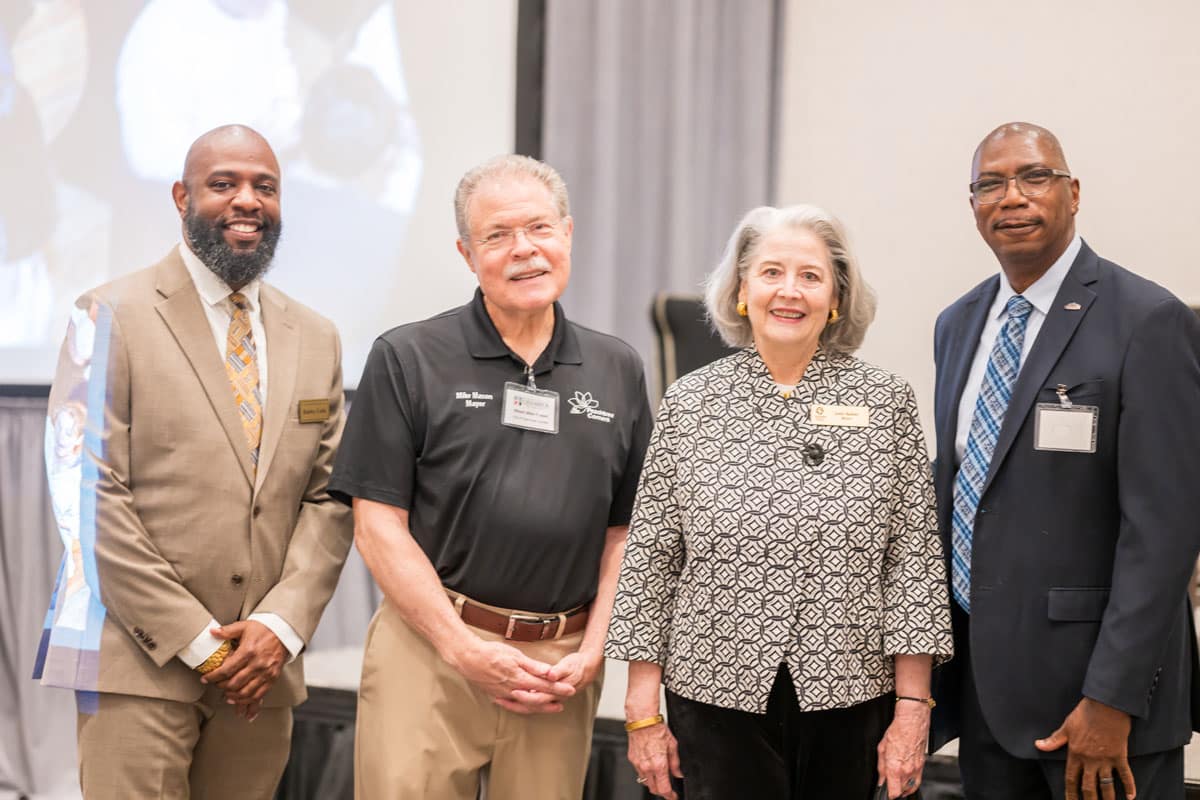
In what has now become tradition, the Southwest Gwinnett Chamber of Commerce hosted mayors from Berkeley Lake, Norcross and Peachtree Corners at a panel discussion on July 12 at the Hilton Atlanta Northeast.
The conversation centered around strategies for revitalizing and expanding metro Atlanta cities, with a focus on redevelopment, zoning ordinance reform, pedestrian and bicycle safety and investing in local schools and affordable housing initiatives.
Zoning changes
“We are beginning a really big project in our city. We have had ordinances that we’ve been working on ever since the city was incorporated in the 1950s,” said Berkeley Lake Mayor Lois Salter.
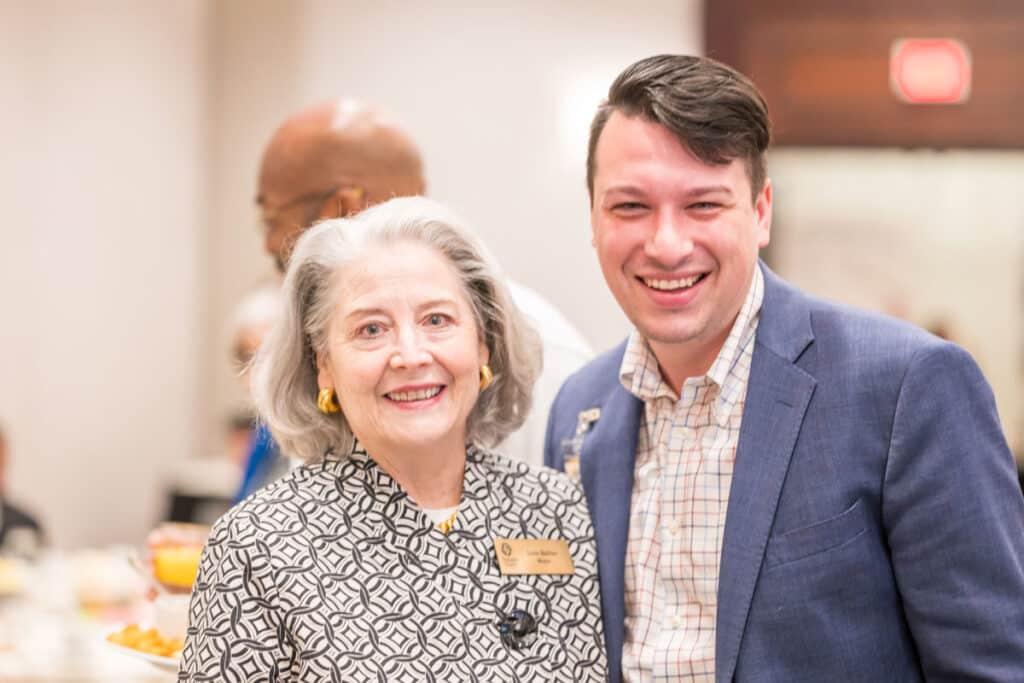
“We feel that we need to overhaul the whole zoning ordinance system and hire a consultant to come and elicit understanding and opinions from our citizens. We want them to be a part of that. We have some folks that resist any kind of regulation. They just want us to regulate their neighbors,” she added.
Norcross Mayor Craig Newton agreed that evolving needs are an important reason to change the zoning, and planning for what lies ahead is paramount. He pointed out that all Georgia cities must implement a comprehensive plan to maintain their qualified local government certifications and remain eligible for selected state funding.
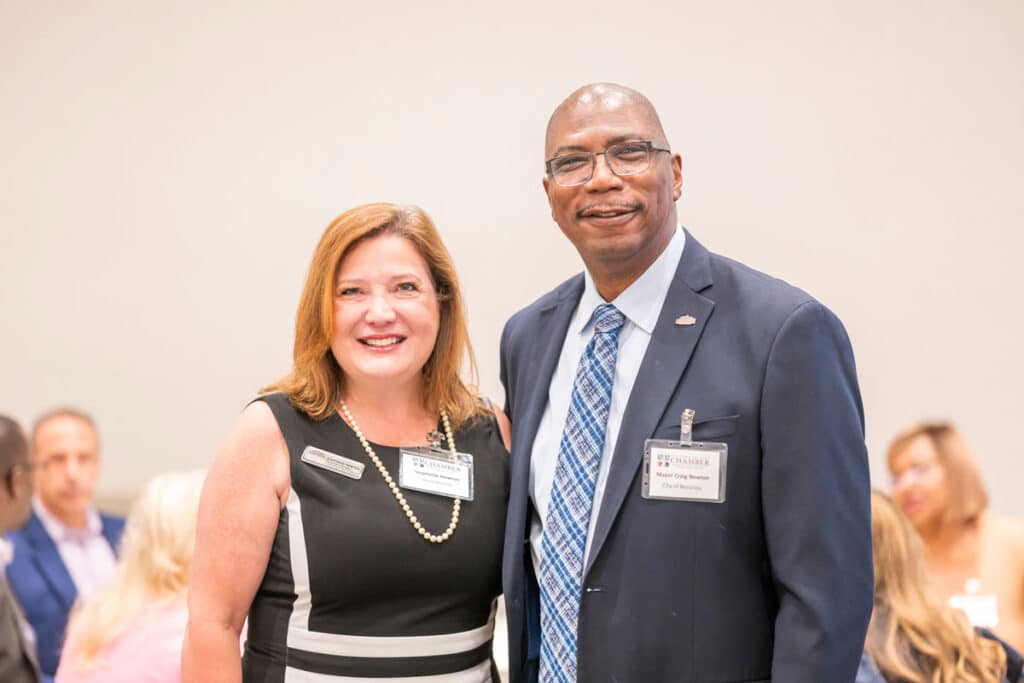
Land development
“We intend to focus on improving pedestrian bicycle safety downtown and establish a sidewalk activity improvement,” he said. “We’re also looking at approving parking in our town center and constructing the Norcross Greenway, which will bring a much-welcomed park, green space and a trail,” he added.
The county announced earlier this year that the project involves redeveloping the existing property into a park that will span almost two acres. It will offer various community spaces, including a multi-use trail, playground, covered picnic area, restroom building and a 41-space parking lot.
In addition to its amenities, a 12-foot-wide concrete trail segment will wind through the park and utility corridor, connecting Singleton Road to Dickens Road.
The trail is part of the 2018 Gwinnett Trails Countywide Trails Master Plan‘s Norcross to Lilburn Trail with an internal loop trail connecting to the neighborhood.
Commercial use
Peachtree Corners has had several “community-friendly” projects come online in the past year, but the effects of the pandemic continue to linger.
“When you think about the future, you’re thinking about the landmass and buildings and commerce. Probably the most significant issue facing a lot of us in the near term is modern office space,” said Peachtree Corners Mayor Mike Mason. “There’s a lot of space. The question is, are people going to come back?”
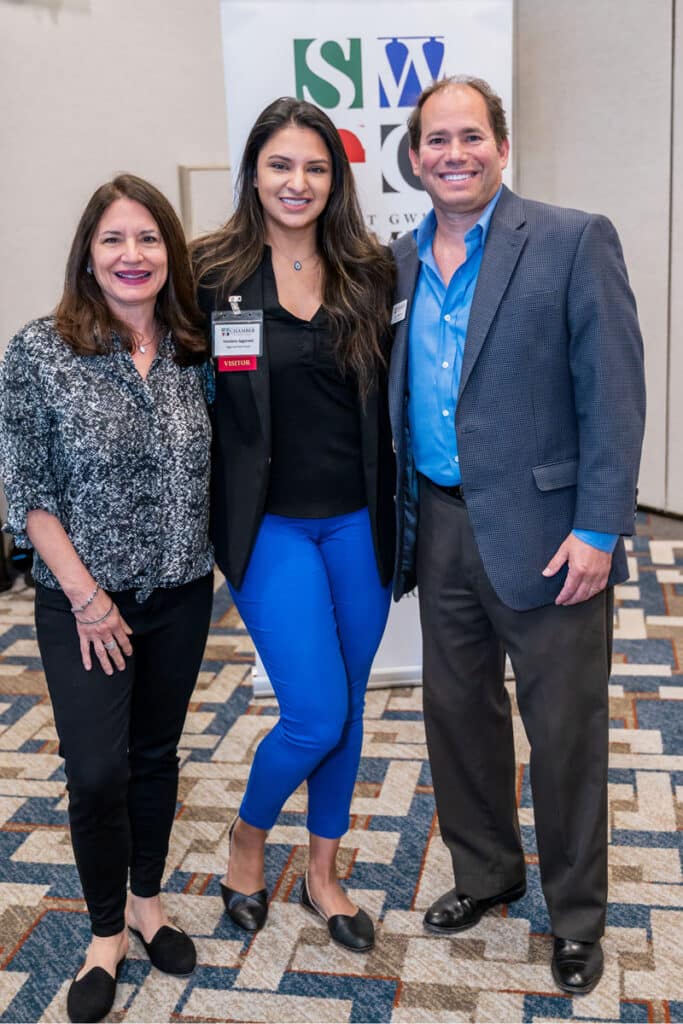
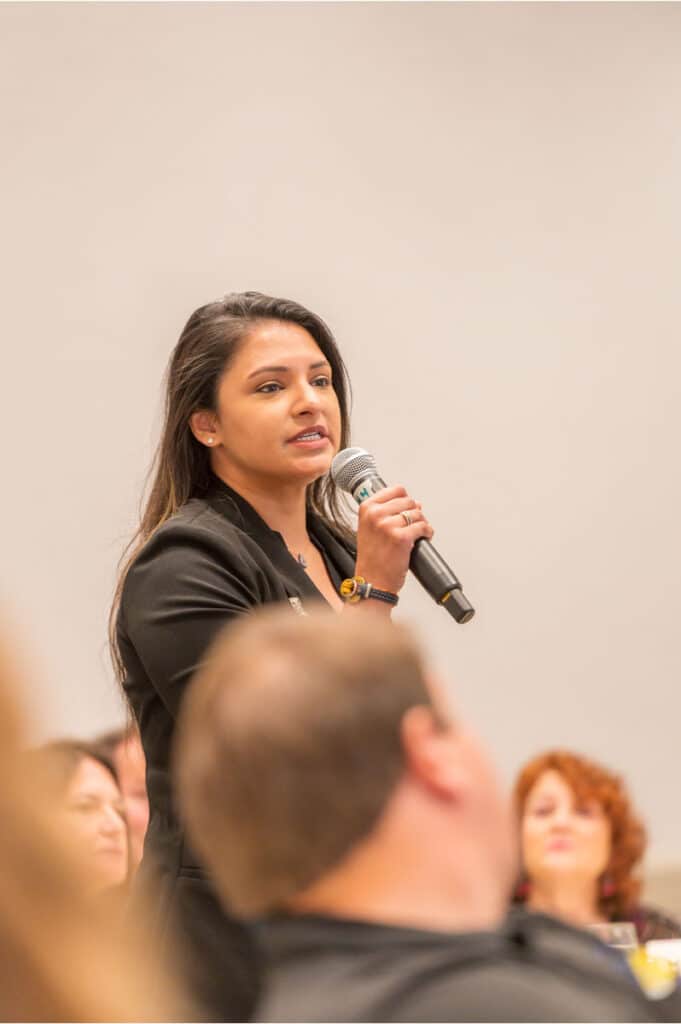
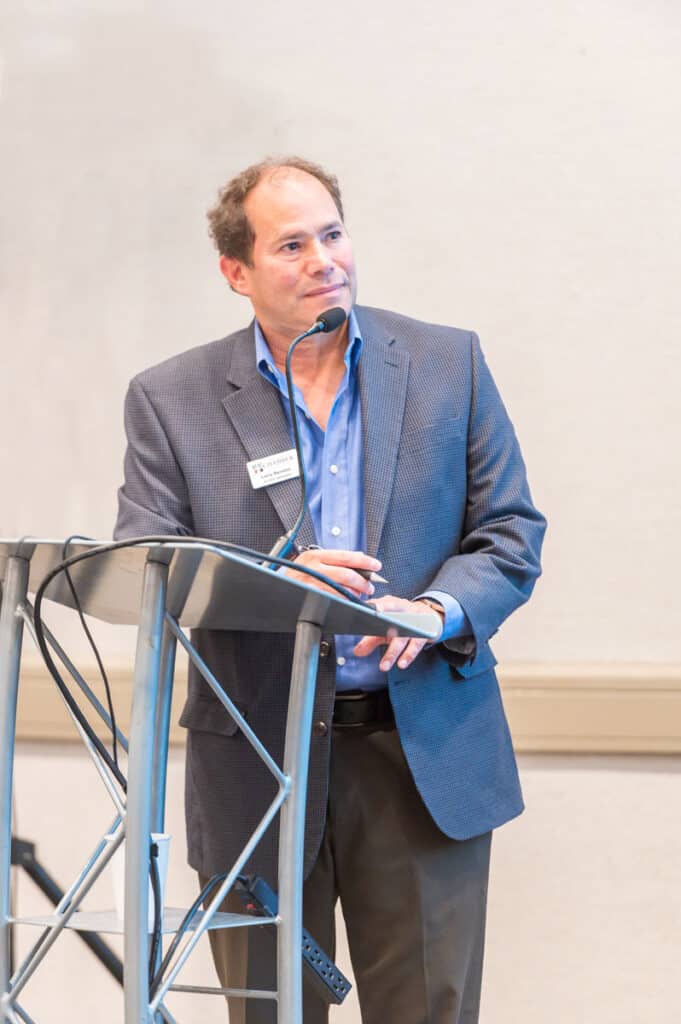
He said that the central retail area has shifted with the revitalization of The Forum and that’s making city leaders rethink city planning.
“We’re having a look at our code and things like that. But from another point of view that will drive the decision about what communities are going to look like,” he said. “For example, there are people coming into the city that say some buildings are technologically obsolete.”
Public safety
Even though Berkeley Lake is the smallest of the three cities and has the highest average home values, all the mayors agreed that public safety is a growing concern.
“Living in Norcross offers residents a dense suburban feel that’s somewhat rural compared to the city of Atlanta,” said Newton. “But some of our public safety initiatives are increasing police presence in high crime areas.”
As the only one of the three cities with a full police department, Norcross is seeking creative ways to implement effective community policing strategies to build trust and communication between law enforcement and the residents.
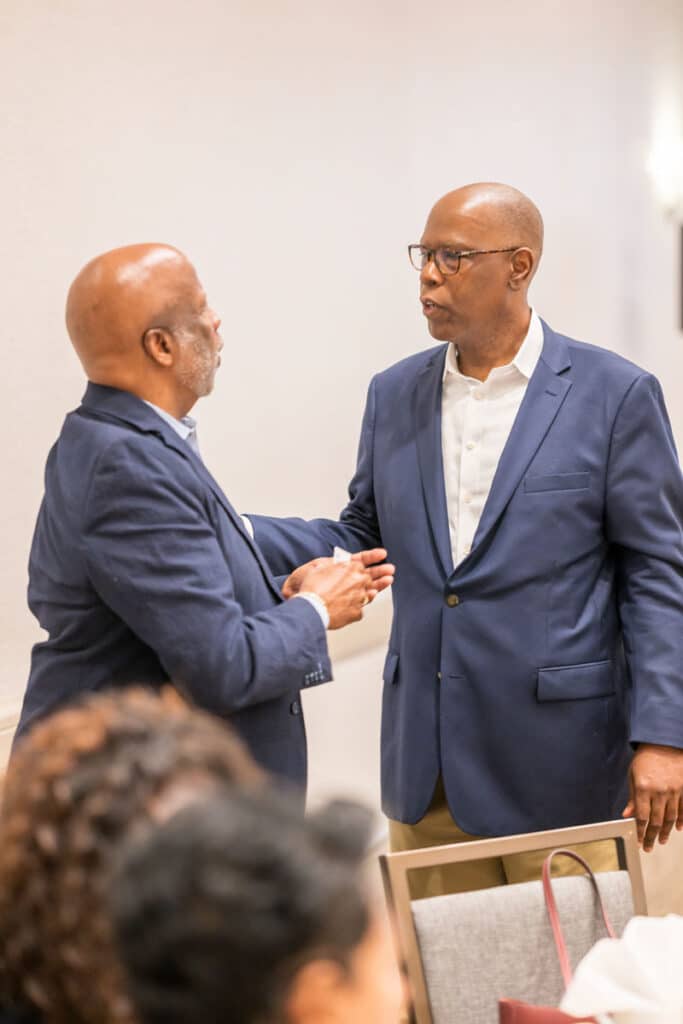
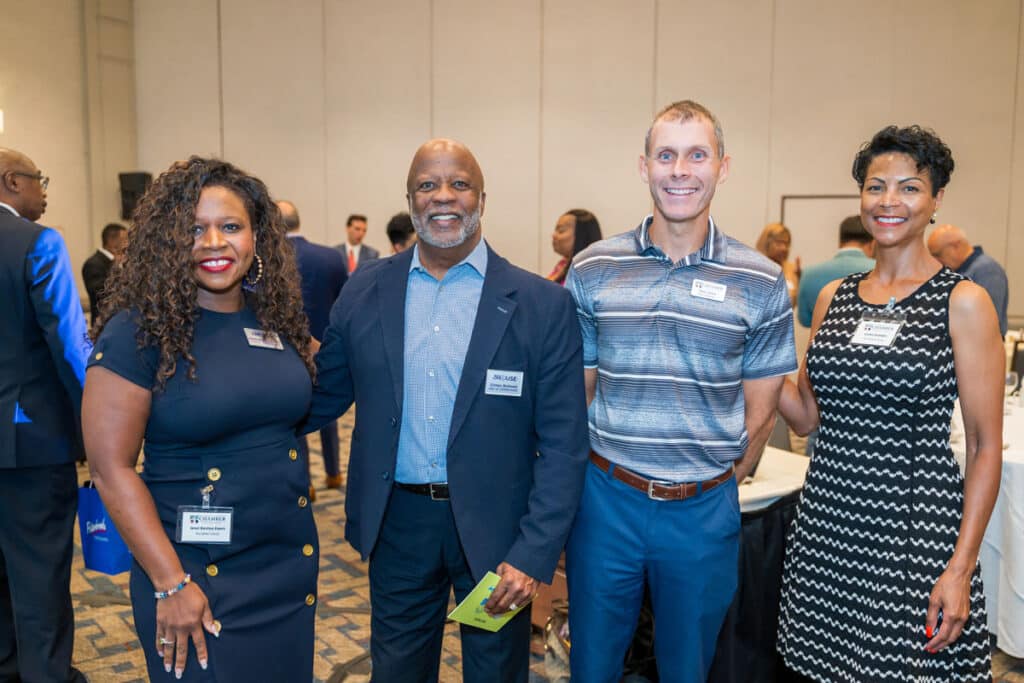
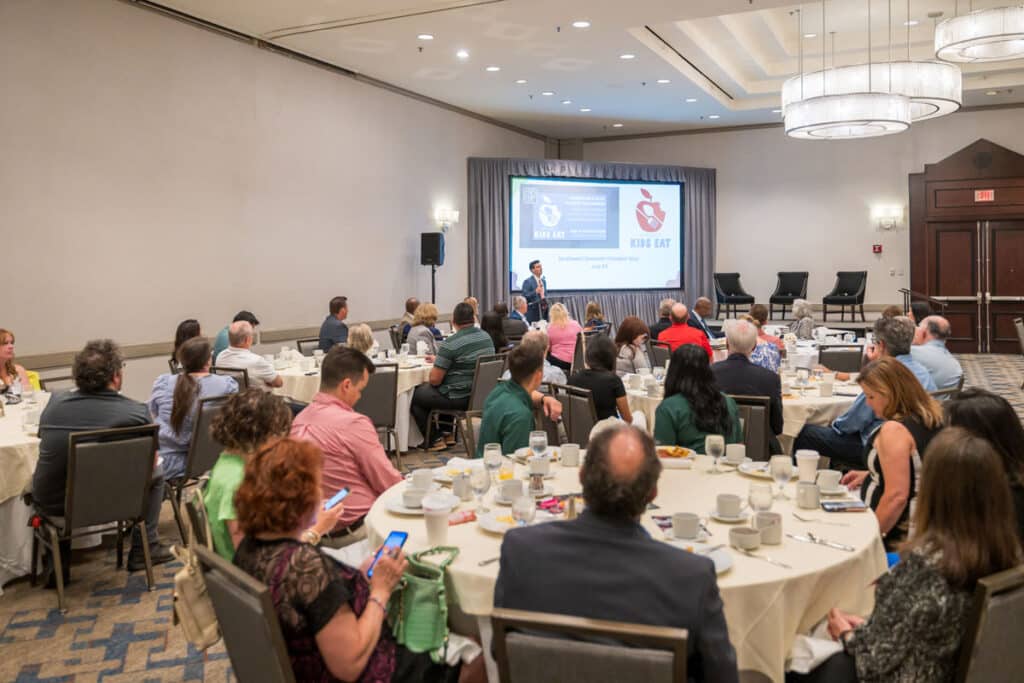
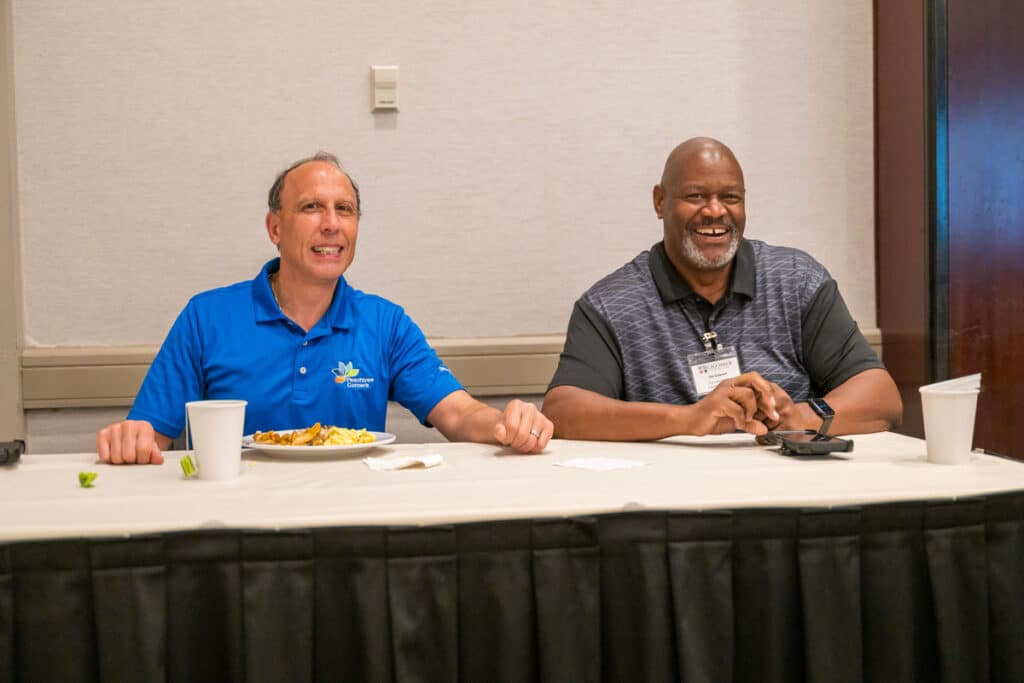
Newton mentioned programs such as Neighborhood Watch, youth outreach programs and educational initiatives along with enhancing emergency response capabilities with training for the local fire department and EMS services.
“Our response time goal is for an officer to be on-site in an emergency within 30 minutes,” he said. “But that doesn’t happen.”
Extended-stay hotels tend to attract crime, so Newton said the city has worked with owners to improve lighting in the public spaces to deter criminal activity.
“We’ve partnered with nonprofit businesses and local stakeholders to support social services employment opportunities for at-risk individuals,” he said. “By working together with various organizations and entities were able to address the complex challenge of public safety.”
Community accountability
With no police force, Berkeley Lake relies heavily on cameras and old-fashioned “knowing your neighbors,” said Salter.
“Some of our individual HOAs are buying and furnishing and paying for cameras to safeguard their neighborhoods,” she said.
Although there may be pockets of criminal behavior around the city, Salter said a police officer once described Berkeley Lake as a “black hole” of crime because there’s so little crime data.
“One of the reasons for that we feel is that historically we’ve been a very neighborly people,” she said. “There is an amazing system of community cohesiveness.”
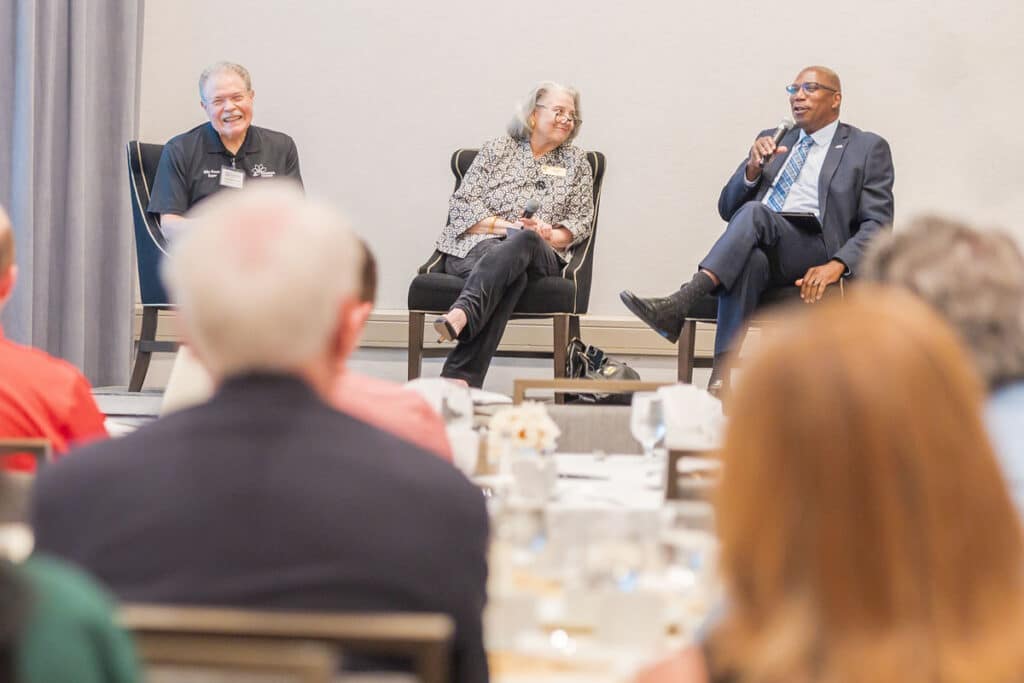
Peachtree Corners is taking its own approach.
“We’ve recently added a Marshal Service and as Lois mentioned we’re also leaning on technology,” said Mason.
The marshal department doesn’t take the place of the services provided by Gwinnett County Police, it primarily enforces city code and aids Gwinnett PD when necessary.
“We’re utilizing as much technology as we can,” said Mason.
Gwinnett PD is instructing where to locate cameras and the city keeps adding them. There have been several instances in the last year or so where coordination among agencies and the use of technology have thwarted or caught criminals.
At the end of the day, the three mayors said the cities all rely on each other. Being so close means that economic development, enhanced entertainment and other desirable amenities are boons for them all.
Related
City Government
Planning and Development is Changing in Peachtree Corners
Published
2 months agoon
June 6, 2024
From Peachtree Corners Mayor Mike Mason’s monthly column.
After the COVID-19 pandemic, the city noticed a development trend that focused on the importance of social interaction. It began seeing development applications for indoor pickleball, virtual racing, garden clubs, car clubs and other recreational uses.
When our city was established in 2012, it adopted Gwinnett County’s codes and ordinances to maintain consistency and these new social interaction-focused uses were not initially considered in the city’s current Comp Plan or zoning code.
Working from home is another market trend having a big impact on local office parks. This economic engine is driven by office parks such as Technology Park and there’s always been a priority placed on preserving office stock.
Even though the commercial office market is waning right now, that pendulum is still trying to figure out where it will settle in. Most of these new socially focused uses find the best home in an office setting.
Due to the increasing number of these applications and the evolving market trends, the city has imposed a six-month moratorium on projects in the Central Business District character area. The moratorium came into effect on May 3 and will end on November 3.
This halt will allow the city six months to pause rezoning applications, special use permits and variances applications for residential or mixed-use development. It will help the city maintain the status quo, stop new applications from coming in and allow for officials to consult with experts and delve deeper into the code and comprehensive plans.
The city plans to conduct extensive research, analysis and strategic planning during this period to help determine if any changes should be made to the comprehensive plan and zoning regulations.
For instance, it might be beneficial to designate downtown as a distinct character area separate from the central business district. Implementing new zoning regulations to transform it into an entertainment district or a unique downtown character area could be a viable option. Many cities have already adopted this type of zoning.
Office parks and businesses throughout the city provide a balance of jobs and residents that allow the city to be the second largest in the state with a zero-millage rate or no city property tax.
Therefore, as part of this process the city will research ways it can preserve, stabilize and enhance the economic engine through the activation of underutilized spaces within office parks.
This proactive approach will help maintain the job-to-resident balance that allows the zero-millage rate while positioning the city for success as the office market pendulum settles.
The most important thing this moratorium does is allow the city to consider what will work best for Peachtree Corners. Furthermore, it communicates to developers that the city requires a pause because current zoning regulations and comprehensive plan do not adequately address future goals.
Related
City Government
Peachtree Corners Welcomes New Community Development Director
Published
2 months agoon
June 2, 2024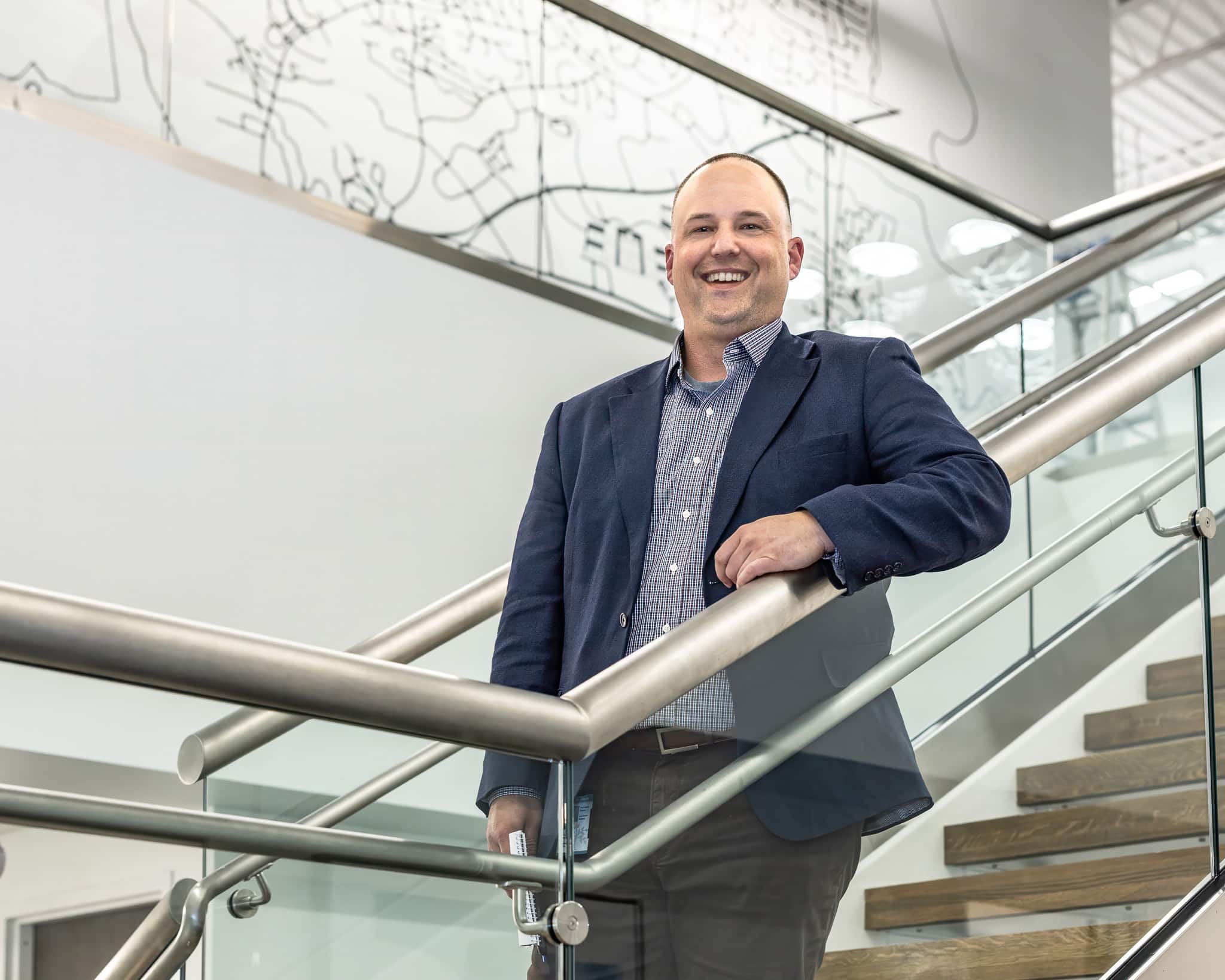
With community development director Diana Wheeler stepping down to pursue a consulting career, Peachtree Corners city leadership turned a challenge into an opportunity.
In January, Shaun Adams was hired as the assistant city attorney to oversee compliance for land use and economic development-related matters and help with legal issues.
His background in public and private sector development made him the ideal replacement.
As luck would have it, Adams moved to Georgia in 2005, selling real estate while attending law school.
“I actually started working down at the capital a lot, lobbying on various policies right out of law school,” he said. “I was the legal counsel for the Senate Judiciary, and that exposed me to ACCG, which is the State County Association, which represents all staff and elected officials for counties across the state.”
With the motto, Advancing Georgia’s Counties, ACCG helps with the policy aspect of things like training and education.
“While I was a lobbyist for them, I focused on economic development, infrastructure-related issues and whatever policies went into place,” Adams said. “We also went around the state and trained our commissioners and their staff on some of those policies and put their new processes in place.”
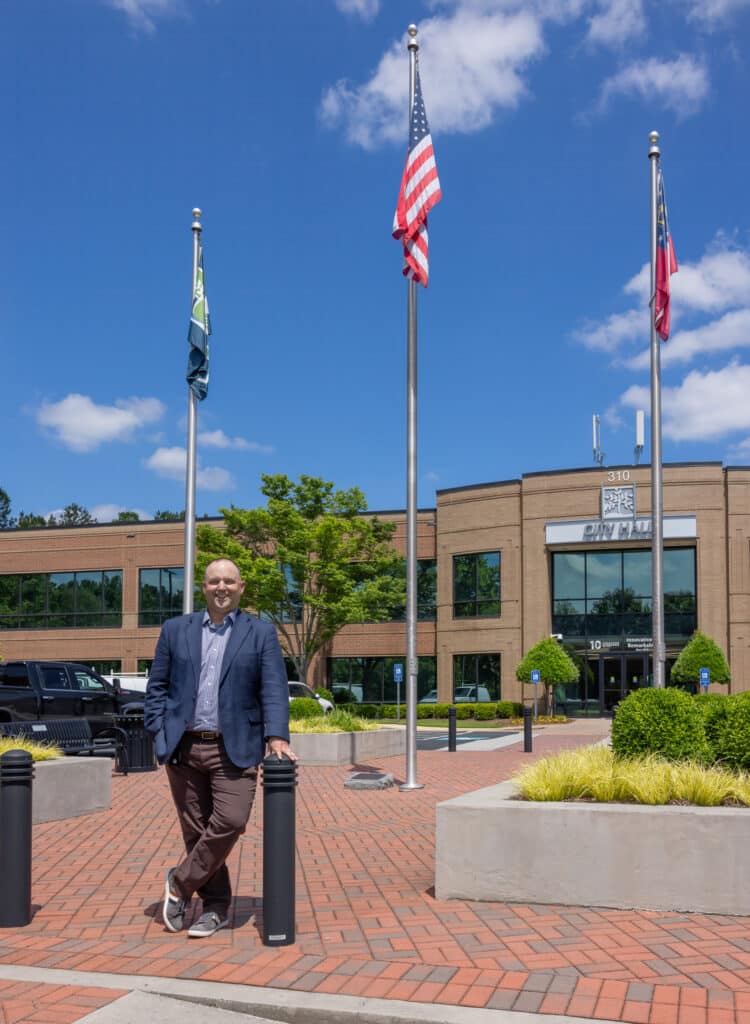
Local government possibilities
“After a handful of years, I got lured away into the private sector,” he said.
Working on land use and government relations matters from the other side of the table, Adams represented developers and investors.
“Sometimes [investors would] come to me with a property that they bought, and they’d say, ‘Hey, we bought this on investment. We’d like to see how we can make the highest and best use of it. Help us create a vision,’” he said. “So, I helped put a team together to determine what we thought could go on the site based off of local government zoning.”
His job entailed working with architects and engineers to design the site and help the client take it to market. Ultimately, the contract purchaser would come in and seek needed entitlements.
“I would help with that,” Adams said. “Those were the fun ones because you got to start on the ground.”
Adams got to know many different local government jurisdictions and worked extensively around metro Atlanta on various matters. On a busy week, he may work with five different jurisdictions across the state.
As a family man with a wife and two sons, he began looking for something that would keep him closer to home.
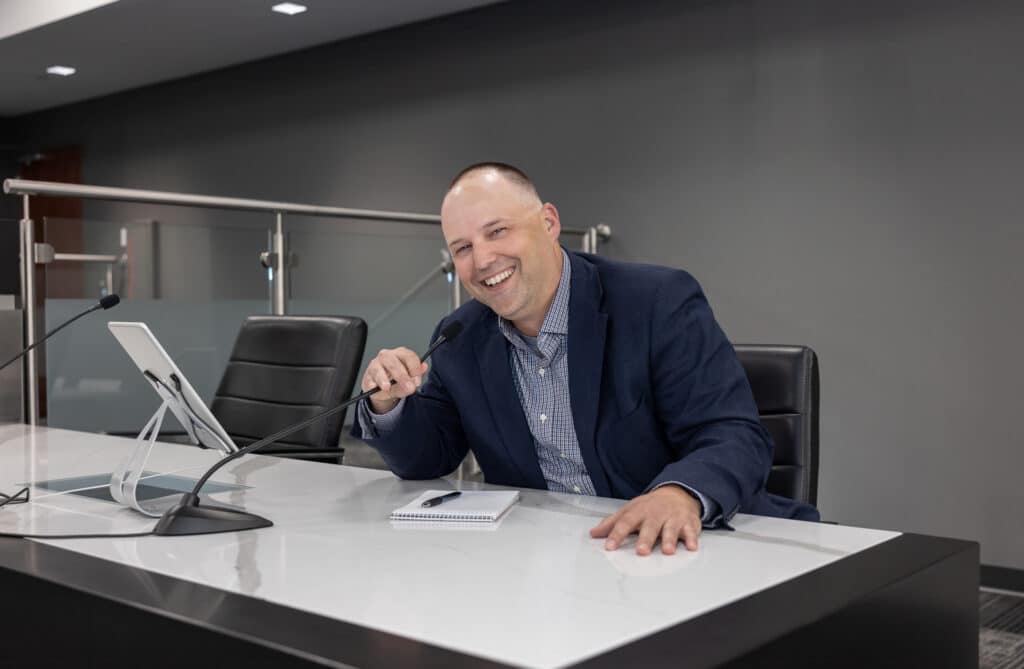
A perfect fit
City Manager Brian Johnson says it was serendipitous that Adams was looking for a position at a time when the city needed someone like him.
“It’s actually a hard position to fill, and I just happened to catch him,” said Johnson. “We were familiar with each other because he’s represented a number of clients coming before the city.”
Johnson said that Adams was legal counsel for some of the most significant developments in the last few years: North American Properties purchasing and revitalizing The Forum, housing development Waterside, and Intuitive Surgical moving its headquarters from the West Coast.
“He was on the other side of the table as we worked together to make these projects ultimately better for the city and better than they were upon their initial submittal,” Johnson said.
“And I knew then that he was a really knowledgeable guy that really knows how to deal with people. He’s a problem solver. He’s always looking for ways to figure out how to resolve conflict and navigate minefields as it relates to land use and all the laws and zoning that apply to it,” he added.
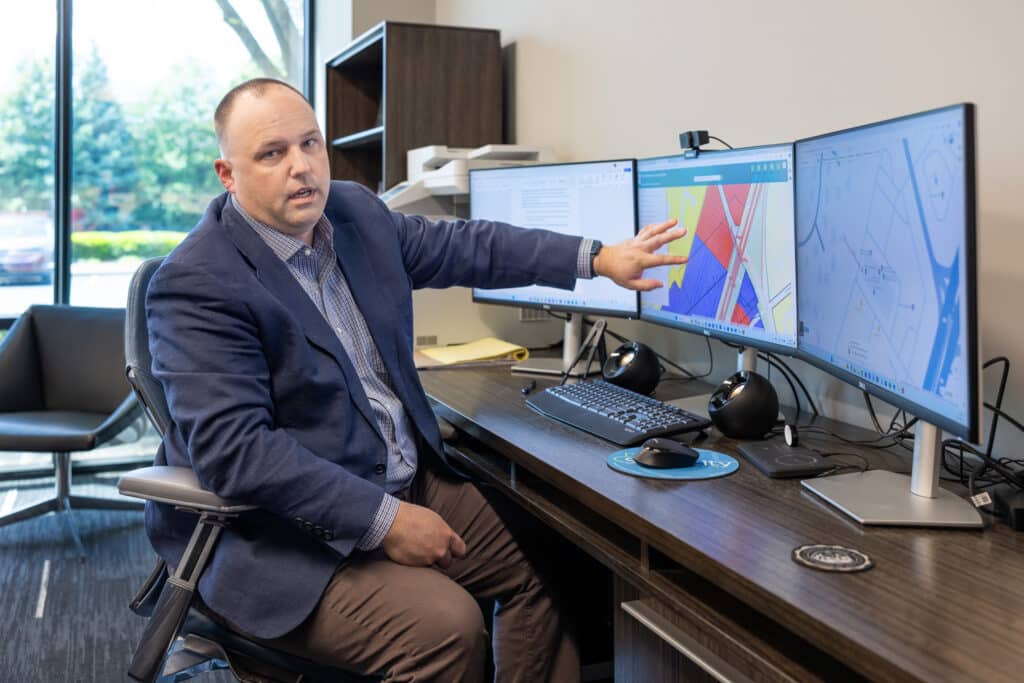
Changes to the job
Although Wheeler is no longer a staffer, she’s still doing work for the city.
With Adams’ legal background, the events planning team will be transitioning out from under community development.
“By taking that off my plate, it’ll allow me to do more with the legal side of things that the position didn’t do previously,” he said.
There will also be a shift with code enforcement duties moving under Chief Marshal Edward Restrepo.
“I moved code enforcement underneath the city marshal’s office because code enforcement and law enforcement are almost like fraternal twins — they both do very similar things,” said Johnson. “Each of them is enforcing a different level of law. Code enforcement is municipal code, and law enforcement is state code, but they work hand in hand.”
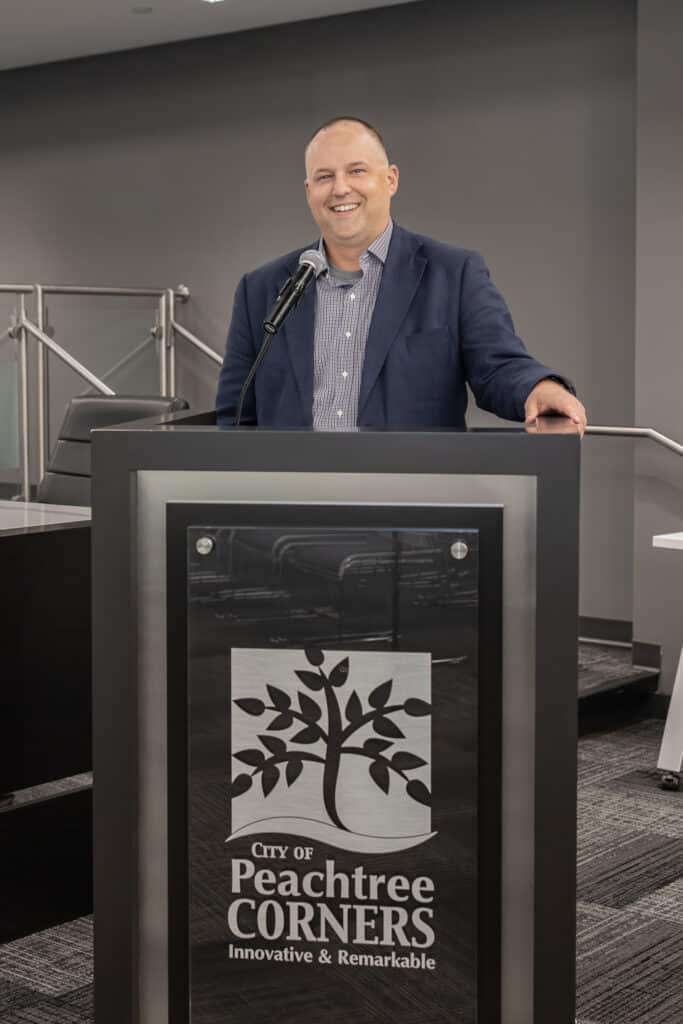
The events planning through the end of the year has already been moved from the community development director’s department. As a consultant, Wheeler will work with other contractors to manage the happenings at the Town Center. Director of Communications Louis Svehla has already moved into managing premier events, Johnson said adding that the city may use more consultants in the future under Svehla’s management.
“He has really shown his ability to manage special events very adeptly. He really showed me that skill set when we had last year’s Criterium bike race,” said Johnson. “I decided to take advantage of some opportunities, including our partnership with Audi, which we were going to announce to the whole vulnerable road user thing.”
With only three months to prepare, Svehla pulled off the event without a hitch.
“He did an outstanding job and so he is capable of taking the management of our community events, our concerts and stuff,” said Johnson.
Johnson said the city is still utilizing consultants for some aspects of special events, but if consultant fees become more expensive than hiring someone full-time to assist Svehla, he’ll make that call.
“All those moves have happened, and I’ll sum it up by just saying that I’m just playing to the strengths of these people and utilizing a great team that I have, and it’s working out really well,” Johnson said.
Related
Read the Digital Edition
Subscribe
Keep Up With Peachtree Corners News
Join our mailing list to receive the latest news and updates from our team.
You have Successfully Subscribed!

What’s going on at Jones Bridge Park and the Challenges of Urban Development

Taste of Peachtree Corners: PCBA Showcases Local Restaurants

The Forum Gives Sneak Peek of New Eateries and Community Spaces

Southwest Gwinnett Mayors Share Visions for the Future

8 Events Happening In and Around Peachtree Corners This August

Peachtree Corners Shines Bright with Light Up the Corners Glow Race this August

Peachtree Corners Shines Bright with Light Up the Corners Glow Race this August

The Forum Gives Sneak Peek of New Eateries and Community Spaces

8 Events Happening In and Around Peachtree Corners This August

Southwest Gwinnett Mayors Share Visions for the Future

Taste of Peachtree Corners: PCBA Showcases Local Restaurants

What’s going on at Jones Bridge Park and the Challenges of Urban Development

Local Resident Opens AtWork Location in Peachtree Corners

CHRIS 180 Expands its Services into Gwinnett County [Podcast]

Light up the Corners [Video]

Capitalist Sage: Business Leadership in Your Community [Podcast]

Cliff Bramble: A Culinary Adventure through Italy

Top 10 Brunch Places in Gwinnett County

A Hunger for Hospitality

THE CORNERS EPISODE 3 – BLAXICAN PART 1

Top 10 Indoor Things To Do This Winter

The ED Hour: What it takes to Remove Barriers from Education
Peachtree Corners Life
Topics and Categories
Trending
-
Business1 week ago
Taste of Peachtree Corners: PCBA Showcases Local Restaurants
-
Business2 days ago
The Forum Gives Sneak Peek of New Eateries and Community Spaces
-
City Government4 days ago
Southwest Gwinnett Mayors Share Visions for the Future
-
Around Atlanta4 days ago
8 Events Happening In and Around Peachtree Corners This August







